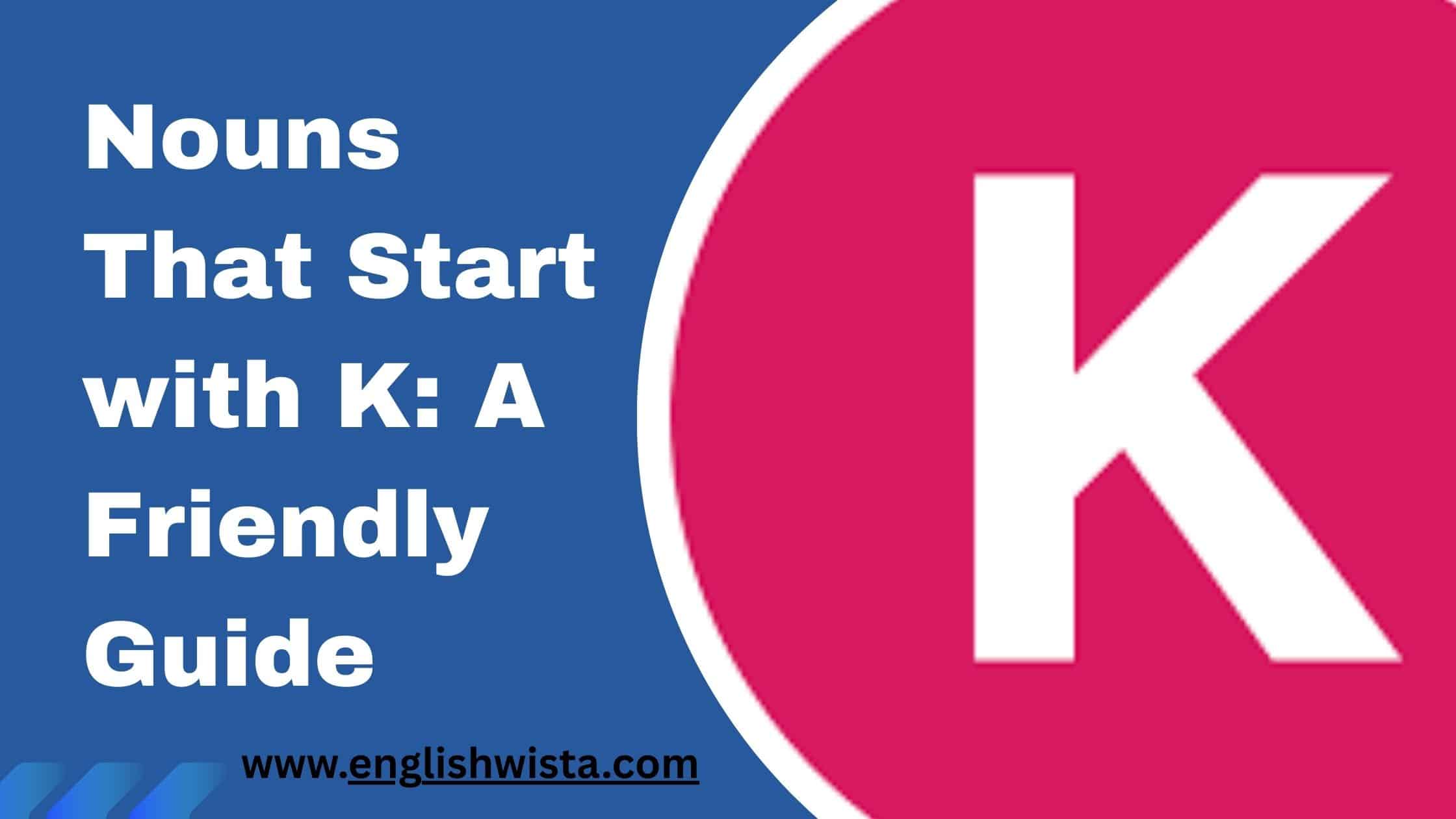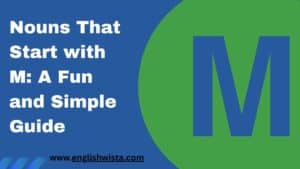Have you ever stopped to think about how many everyday words begin with the letter K? From food like “kale” to animals like “kangaroo,” this letter has given us some truly memorable nouns. Nouns, as you may already know, are the names we give to people, places, things, or ideas. And when we focus on just one letter, like K, we start to notice how many interesting words it brings into our conversations.
In this guide, we’re going to explore nouns that start with K in a simple and friendly way. Don’t worry if English grammar feels tricky this article is designed for beginners, non-native speakers, and even anyone who just enjoys learning about words. By the end, you’ll feel more confident using K-nouns in your everyday speaking and writing.
So, grab a cup of tea (or maybe a kiwi smoothie), and let’s dive into the world of nouns that start with K!
What Are Nouns, in Simple Words?
Before we focus on the letter K, let’s quickly remind ourselves what nouns are. Nouns are words that give names to people, places, things, or even ideas. For example:
- Person: king, kid, knight
- Place: kitchen, Kenya, kindergarten
- Thing: kite, key, kettle
- Idea: kindness, knowledge
See how easy that is? If you can name it, it’s probably a noun.
Why Focus on Nouns That Start with K?
You might be wondering, “Why K?” The letter K isn’t the most common starting letter in English, but it has a lot of unique and useful words. It also gives us some fun sounds, like the strong “k” in kangaroo or the silent “k” in knife. Learning K-nouns will expand your vocabulary, help you express yourself better, and make English more fun to use.
Common Nouns That Start with K
Let’s start with some everyday nouns that you’re likely to hear often.
- Key – something you use to open a lock.
- Kite – a toy that flies in the wind.
- Kid – an informal word for child.
- Kitchen – the room where we cook food.
- King – a male ruler of a country.
- Knee – the joint between your thigh and lower leg.
- Kettle – a container used for boiling water.
- Kiss – an act of pressing your lips to show love or greeting.
These are nouns you’ll hear in daily conversations.
Example sentences:
- I lost my key yesterday, and I couldn’t open the door.
- The children are flying a colorful kite in the park.
- The king lived in a grand castle.
Food Nouns Starting with K
Food is always a fun way to learn vocabulary. The letter K has given us plenty of delicious nouns.
- Kiwi – a small fruit with green flesh.
- Kale – a leafy green vegetable.
- Kebab – grilled meat or vegetables on a stick.
- Kimchi – a spicy Korean side dish made with fermented vegetables.
- Ketchup – a tomato-based sauce.
Example sentences:
- I added fresh kale to my salad.
- My friend loves kimchi with rice.
- We ate chicken kebabs at the barbecue.
Animal Nouns That Start with K
Animals are another great area for K-nouns.
- Kangaroo – a large animal from Australia.
- Koala – a tree-dwelling animal from Australia.
- Koi – a colorful type of fish.
- Kitten – a baby cat.
- Kingfisher – a bird with bright feathers.
Example sentences:
- The kangaroo hopped across the field.
- She adopted a cute little kitten.
- A koala spends most of its time sleeping in trees.
People and Titles with K
Some nouns describe people, their roles, or titles.
- Kid – child.
- King – male ruler.
- Knight – a soldier from medieval times.
- Killer – someone who kills.
- Kinsman – a male relative.
Example sentences:
- The brave knight wore shiny armor.
- The kid is playing in the garden.
- The king addressed his people from the balcony.
Places That Start with K
There are also many nouns for places that begin with K.
- Kenya – a country in Africa.
- Kuwait – a country in the Middle East.
- Kathmandu – the capital of Nepal.
- Kindergarten – a school for very young children.
- Kitchen – the room where food is prepared.
Example sentences:
- She studied in Kenya for three years.
- The children are singing songs in kindergarten.
- My mother is in the kitchen, cooking dinner.
Abstract Nouns Starting with K
Not all nouns are physical things. Some are ideas or qualities.
- Knowledge – information and understanding.
- Kindness – being friendly and caring.
- Karma – the idea that good or bad actions bring future results.
- Kinship – the relationship between family members.
Example sentences:
- Reading books helps us gain knowledge.
- Her kindness touched everyone’s heart.
- Some people believe in karma.
Fun Facts About the Letter K
Here are some extra details that make K special:
- The letter K is sometimes silent, as in knife and knee.
- In texting or online chats, people sometimes use “K” as a short way of saying “okay.”
- The word kangaroo comes from the Guugu Yimithirr language spoken by Indigenous Australians.
- The plural of many K-nouns follows regular English rules, like keys, kings, or kitchens. But some words are irregular, like kids (which doesn’t follow a simple pattern).
How to Remember Nouns That Start with K
Here are a few tips to make these nouns stick in your mind:
- Group them by category. For example, learn all the animal nouns (kangaroo, koala, kitten) together.
- Use them in sentences. Practice writing short sentences, like “The kitten is sleeping.”
- Play word games. Try to list five K-nouns whenever you have free time.
- Notice them in daily life. Next time you’re in the kitchen, think of all the K-words there (kettle, knife, kitchen).
Quick Recap of K-Nouns
We’ve explored many types of nouns starting with K:
- People and Titles: kid, king, knight
- Places: Kenya, kitchen, kindergarten
- Things: kite, key, kettle
- Food: kiwi, kebab, kimchi
- Animals: kangaroo, koala, kitten
- Ideas: knowledge, kindness, karma
Conclusion
And there we have it an exciting journey through nouns that start with the letter K. From kings and kitchens to koalas and kebabs, K has given us words that describe the people we meet, the foods we eat, the places we visit, and even the values we hold.
The best way to remember these nouns is to practice them in your daily conversations. Next time you’re in the kitchen, think of the kettle. When you see a child, think of the word kid. And when you want to share something nice, show kindness.
Learning vocabulary doesn’t have to be boring. When you break it down letter by letter, it becomes a fun and rewarding journey. So keep practicing, keep noticing K-nouns around you, and soon they’ll become a natural part of your English skills.



